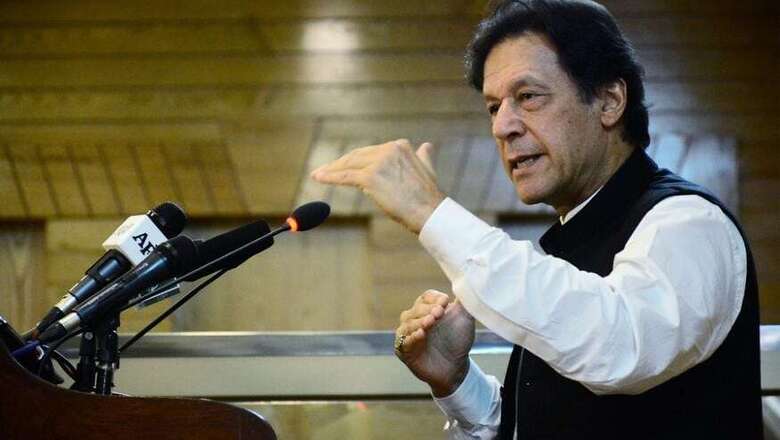
views
Islamabad: Pakistan on Monday rejected as "speculative and misleading" a media report which claimed that the institutional differences led to an embarrassment after Prime Minister Imran Khan pulled out of a key summit of Muslims nations held in Malaysia last week.
Quoting the Foreign Office officials, The Express Tribune reported that the Foreign Ministry in categorical terms warned Prime Minister Khan that his decision to attend the summit would draw backlash from Saudi Arabia, a key ally. But the advice was ignored by the PM Office and Khan accepted the invite, only to decline it at the eleventh hour due to pressure exerted by Saudi Arabia and the United Arab Emirates.
The Summit from December 19-21 in Kuala Lumpur was seen as an attempt to create a new bloc in the Muslim world that could become an alternative to the dysfunctional Organisation of Islamic Cooperation (OIC) led by the Saudis.
In a brief statement, the Foreign Office on Monday said that the media report on Kuala Lumpur Summit was based on "opinions" by unnamed officials and rejected it as "speculative, misleading and self-contradictory".
The FO pointed out that the news report "betrayed lack of understanding of the exhaustive consultations process involved in important policy decisions and overlooked the extensive diplomatic outreach at multiple levels undertaken on this subject."
It further said that the "insinuation of any gap between various offices is firmly rejected."
Quoting unnamed Foreign Office officials, the paper said that many, particularly former diplomats, were baffled whether or not the Foreign Office had forewarned the government about the implications of accepting the Kuala Lumpur summit invite without first taking Saudi Arabia into confidence.
"Background interactions with senior Foreign Office officials, however, revealed that the Prime Minister's Office had been forewarned about possible Saudi backlash," according to the report.
The officials, who spoke on the condition of anonymity, told the paper that the Foreign Office had advised caution when the government received the invitation of summit, which was viewed by Saudi Arabia and its Middle Eastern allies with a lot of suspicion.
The Prime Minister's Office, instead of paying heed to the advice, confirmed Pakistan's participation, the officials claimed.
"Had the government paid heed to the advice, Pakistan would not have faced embarrassment (on the diplomatic front)," said one official.
He said the government was informed in categorical terms that the decision to attend the Kuala Lumpur summit was bound to invite Saudi backlash.
"We had suggested to first assess the purpose and objectives of the summit, the official said, but unfortunately before any homework, the prime minister had already consented to attending the summit in Malaysia.
Asked whether the prime minister was not aware of the political dynamics in the Muslim world, another official said: "In this government, the Foreign Office has little role in policymaking. Most of the decisions on foreign policy are being taken without consulting the Foreign Office."
The official referred to another instance when the Foreign Office's advice had been ignored by the government.
In October, when an Afghan Taliban delegation, led by Mullah Abdul Ghani Baradar, visited Pakistan, senior officials wanted to keep the visit low profile, with no media publicity.
But instead of listening to the senior officials, Foreign Minister Shah Mehmood Qureshi went out of the way to greet the Taliban delegation at the Foreign Office.
Images released by the Foreign Office showed Qureshi and a high-ranking security official embracing the Taliban leaders.
"This was an ill-advised move," the official added.
One of the reasons the Foreign Office advice is being ignored by the government is incumbent foreign secretary Sohail Mehmood who rarely asserts his authority, according to insiders.
Many senior officials are upset and believe the Foreign Office is being held responsible for the blunders it has nothing to do with.
"When your prime minister takes decisions on foreign policy on the spur of the moment without first seeking advice from the Foreign Office, it is hard to avoid embarrassing situations like the one we witnessed over the Kuala Lumpur summit, the official lamented.
Former Ambassador Abdul Basit was also surprised over the mishandling of the Malaysia summit issue.
Basit, who has served as Pakistan's ambassador to India and Germany, argued that the Foreign Office should have first done the spadework and consulted the Saudis through formal and informal channels before taking any decision.
The government's explanation for not attending the summit was that Pakistan wanted to maintain its neutrality. Foreign Minister Qureshi, while chatting with media persons last week, insisted that the decision was taken in the best national interest and looking at the larger picture.
Turkish President Recep Tayyip Erdogan, however, claimed that Pakistan skipped the summit because Saudi Arabia threatened to withdraw financial assistance and expel millions of Pakistanis working in the Gulf Kingdom.
Saudi Arabia denied the claim as baseless.
The Saudis and Emiratis provided at least USD 6 billion to Pakistan after Khan came to power last year to support faltering economy.


















Comments
0 comment